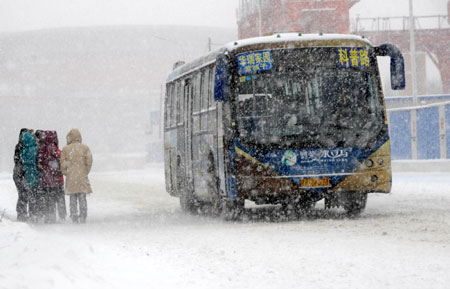Heavy snow brought on by the coldest temperatures so far this year caused chaos for thousands of travelers in North China Thursday.
|

|
|
A bus makes its way along a snow-covered road in Shenyang, Northeast China's Liaoning Province, January 22, 2009. [Xinhua] |
More than 30 flights were delayed at Taoxian International Airport in Shenyang, capital of Liaoning province, when it was closed for five hours to allow staff to clear snow off the runways. Flights eventually resumed at 11 am.
Eight expressways were also closed in the province, while traffic on six others was brought to a halt, a provincial government spokesman, who declined to be named, said.
Heavy fog disrupted 27 flights in Wuhan, Hubei province, while ferry services between Yantai in Shandong province and Dalian in Liaoning province were suspended and are not expected to resume until tomorrow.
|

|
|
Local residents clear snow on the street of Bole, northwest China's Xinjiang Uygur automomous region, January 22,2009. [Xinhua] |
In Sichuan, four expressways were also closed due to fog and rain.
Temperatures plunged by 8 to 10 C in China's most northern province, Heilongjiang. They fell to minus 27 C in Harbin, the provincial capital, the provincial meteorological station said.
The mercury also fell 10 C in Beijing, which was battered by strong winds; and 16 C in parts of Xinjiang, Gansu, Ningxia, Shaanxi, Shanxi and Hebei yesterday morning. In Inner Mongolia it plummeted by 20 C.
The cold front, which started on Tuesday, has affected most parts of northern China and is expected to move south, the China Meteorological Administration (CMA) warned.
"Based on current weather forecast, there is little probability of rain in large areas and snow disasters like last winter in southern China, though some parts have the likelihood of icy rain," said Zong Zhiping, the CMA's chief weatherman.
Temperatures were predicted to fall by 14 C around the Huaihe River, with sleet and snow expected south of the Yangtze River and in parts of Guizhou.
The CMA issued an orange alert on Wednesday, meaning temperatures are expected to drop by 12 C in 24 hours to below zero.
Local governments should prepare for emergencies, such as breakdowns in heating and water supplies and traffic jams, the CMA said.
It also warned farmers to take precautions to prevent losses to crops or stock.
(China Daily January 24, 2009)